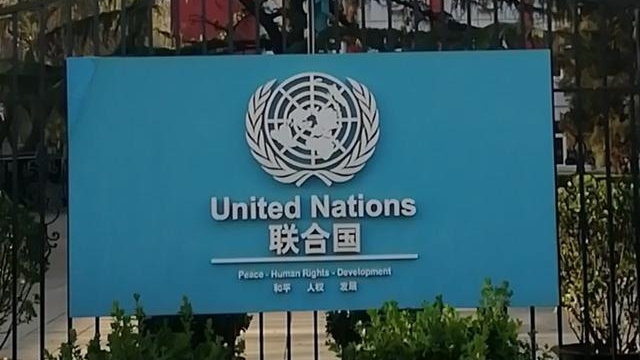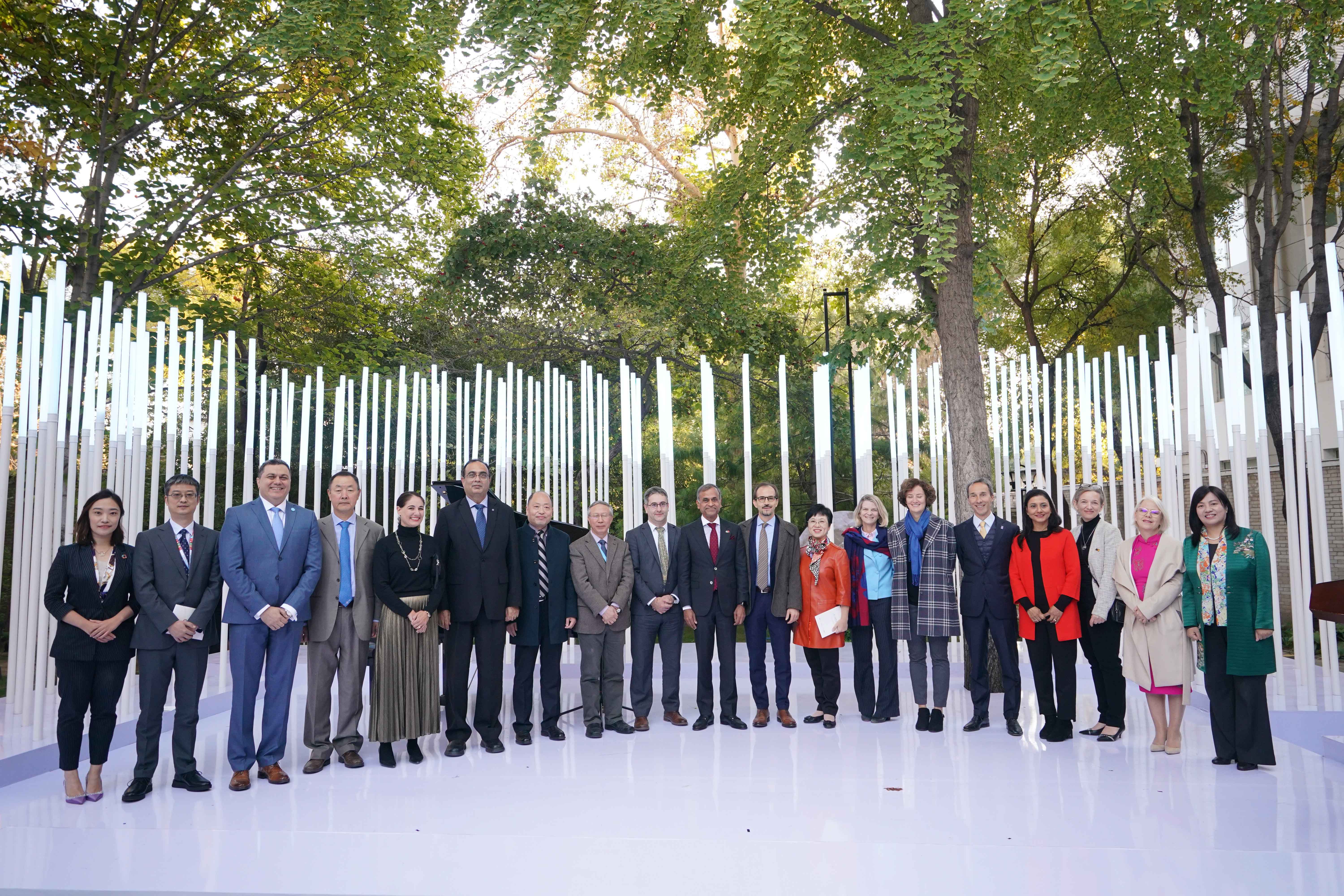
The gate of the Office of the United Nations Coordinator in China. /UN
The gate of the Office of the United Nations Coordinator in China. /UN
Editor's note: On 50 years of the common goal of achieving peace and prosperity, the heads and the representatives of UN mission in China, gave their thoughts on the friendship between China and each agency. The article reflects the authors' views and not necessarily those of CGTN.
Half a century has passed since UNGA Resolution 2758, when China entered the world stage under the spotlight of international peace and prosperity. This was when the decision was made to restore all rights to the People's Republic of China in the United Nations (UN) on October 25, 1971.
Chinese President Xi Jinping addressed a conference marking that event on Monday. As he pointed out, the seat restoration was "the result of joint efforts of all peace-loving countries that stood up for justice in the world. It marked the return of the Chinese people, or one-fourth of the world's population, back to the UN stage. The importance was significant and far-reaching for both China and the wider world."
To mark this special occasion, representatives of UN agencies in China shared some of their opinions and wishes.
Cooperation over the years
Siddharth Chatterjee, resident coordinator of the UN in China, praised China, noting that it "was one of the architects of the United Nations and was the first signatory of the UN Charter in San Francisco in 1945."
That act was a signal to the world that an international organization like the UN cannot work without China's participation.
Chatterjee praised China's domestic policies throughout recent decades, after the restoration of its lawful seat in 1971, which was beneficial to the UN and vice versa. As part of China's reform and opening-up policy era, "in 1979, China chose to accept development assistance from the UN, learning from its long experience in poverty alleviation and industrial and agricultural growth."
The United Nations Environment Programme (UNEP) was in charge of the secretariat of the Kunming Conference.
Tu Ruihe, head of UNEP's China Office, spoke of the bond between UNEP and China. "After UNEP was founded in 1972, China established its environmental protection agency – the State Council Environmental Protection Leadership Group Office – and held the first national conference on environment protection," he noted.
Justine Coulson, the United Nations Population Fund (UNFPA) representative in China, shared the history of women's rights cooperation: "Over the past 50 years, China has made remarkable progress in reducing maternal mortality. Since 1979, UNFPA has worked closely with the Government of China to support the strengthening of sexual and reproductive health information and services for all women."
Interdependent at present
Fifty years have passed, and as China has developed much, the UN recognizes it cannot have multilateralism without China.

The UN Country Team in China. /cn.un.org.cn
The UN Country Team in China. /cn.un.org.cn
In 2020, a pandemic spread rapidly around the world. China acted fast to respond to it, alerting the world through the UN and the World Health Organization. Chatterjee supported China's important role in the world of setting an example in combating COVID-19, saying that "China's generosity and leadership on this front are commendable."
As well as protecting human life, the conservation of flora and fauna is also a matter of human and planetary survival. That's why the COP15 Biodiversity Conference held in Kunming recently mattered for all living beings.
Tu Ruihe stated that when it comes to the protection of biological diversity, the nation has many good practices to share with the international community and can offer the "China approach" to ecosystem restoration.
On the ecology, Beate Trankmann, the resident representative of the United Nations Development Program (UNDP) in China, explained why protecting plants and animals benefits human beings in an interactive way.
"Our planet can only continue to sustain us if we protect its biodiversity – the individual yet interconnected chain of plant and animal species that hold our world together," she said. "Every life form, however tiny, is essential to the whole."
Shahbaz Khan, director of the UNESCO office in Beijing, laid out the blueprint for eco-civilization. "Putting biodiversity on a path of recovery is a defining challenge of this decade. The implementation of a visionary and game-changing post-2020 global biodiversity framework calls for mutual trust and firm political support, which are vital pillars to multilateralism."
Interactions in the future
As China begins to play an even more constructive role globally, China and the UN are examining their interactive future. How will China and the UN plan for the future?
When envisioning the UN Sustainable Development Goals (SDGs) which are to be achieved by 2030, from now on, the world is in what is called the "Decade of Action." Chatterjee suggests three areas for close cooperation at this critical juncture, including an idea to create a new sustainable development model, a will to combat climate change and a contribution to upholding multilateralism.
Smriti Aryal, head of UN Women China, together with Matteo Marchisio, country director and representative of the International Fund for Agricultural Development (IFAD), emphasized the critical role that rural women can play in enhancing agricultural and rural development, as in China, the percentage of women in agriculture is as high as 70 percent.
They shared four messages to achieve these goals: Empower rural women; give rural women the same access to assets and opportunities as men; include women as active decision-makers; and fully understand that gender equality is not a zero-sum game of "depowering" men.
On the topic of population, Coulson said, "With Healthy China 2030 and the expanded focus on health and well-being across the life-course, as well as the recent introduction of the 'three-child policy,' the UNFPA will continue to work with the government of China to ensure quality sexual and reproductive health (SRH) for women of all ages, and to support the sharing of China's SRH expertise and experiences globally to transform the lives of women in other countries."
China and the UN have achieved a great deal in the last half-century. In the next 50 years and beyond, both sides will work together to build a shared future for humankind.
(If you want to contribute and have specific expertise, please contact us at opinions@cgtn.com.)

